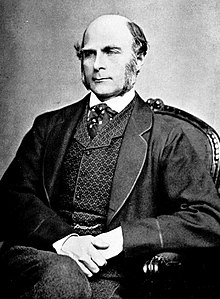Sir Francis Galton
| Sir Francis Galton | |
|---|---|
 |
|
| Born |
16 February 1822 Birmingham, West Midlands, England |
| Died | 17 January 1911 (aged 88) Haslemere, Surrey, England |
| Residence | England |
| Nationality | British |
| Fields | Anthropology, Sociology |
| Institutions | Meteorological Council Royal Geographical Society |
| Alma mater |
King's College London Trinity College, Cambridge |
| Academic advisors | William Hopkins |
| Notable students | Karl Pearson |
| Known for |
Eugenics Behavioural genetics The Galton board Regression toward the mean Standard deviation Weather map |
| Notable awards | Royal Medal (1886) Darwin–Wallace Medal (Silver, 1908) Copley Medal (1910) |
Sir Francis Galton, FRS (/ˈfrɑːnsɪs ˈɡɔːltən/; 16 February 1822 – 17 January 1911) was an English Victorian statistician, progressive, polymath, sociologist, psychologist,anthropologist, eugenicist, tropical explorer, geographer, inventor, meteorologist, proto-geneticist, and psychometrician. He was knighted in 1909.
Galton produced over 340 papers and books. He also created the statistical concept of correlation and widely promoted regression toward the mean. He was the first to apply statistical methods to the study of human differences and inheritance of intelligence, and introduced the use of questionnaires and surveys for collecting data on human communities, which he needed for genealogical and biographical works and for his anthropometric studies.
...
Wikipedia
